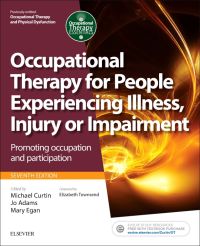Occupational Therapy for People Experiencing Illness, Injury or Impairment, 7th Edition
Formerly entitled Occupational Therapy and Physical Dysfunction this seminal textbook builds on the strengths of all previous editions and continues to explore the work of occupational therapists with people who are experiencing illness, injury or impairment. It links theory with day-to-day practice, stimulating reflection on the knowledge, expertise and attitudes that inform practice, and encouraging the development of occupation-focused practice.
The new title, Occupational Therapy for People Experiencing Illness, Injury or Impairment, reflects the knowledge, attitudes and skills that underpin the practice of promoting occupation and participation. It showcases how occupational therapists work with people – not medical conditions and diagnoses – as individuals, groups, communities, and populations.
The new edition now has additional chapters on the assessment and intervention stages of the professional reasoning process to assist development of enabling skills and strategies. It also includes many more practice stories throughout to provide authentic examples to illustrate the application of theory to practice. Learning is further reinforced via access to a new online resource – Evolve Resources – which includes MCQs, reflective questions and three bonus interactive practice stories with accompanying reflective videos. These are all signposted within the textbook.
Now compromising seven sections, which follow the professional reasoning format of the Canadian Practice Process Framework (CPPF), the new edition first tracks the evolution of occupational therapy in the context of health care. It then examines the foundational biomedical and social sciences, in addition to occupational science, before going on to the areas of assessment; writing occupation-focused goals; enabling skills and strategies which include advocacy and lobbying, public health, and community-based rehabilitation. The book ends with a chapter on developing effective reflection skills to enable occupational therapists to critically evaluate their practice, evolve as practitioners, and maintain and develop their professional competencies.
Formerly entitled Occupational Therapy and Physical Dysfunction this seminal textbook builds on the strengths of all previous editions and continues to explore the work of occupational therapists with people who are experiencing illness, injury or impairment. It links theory with day-to-day practice, stimulating reflection on the knowledge, expertise and attitudes that inform practice, and encouraging the development of occupation-focused practice.
The new title, Occupational Therapy for People Experiencing Illness, Injury or Impairment, reflects the knowledge, attitudes and skills that underpin the practice of promoting occupation and participation. It showcases how occupational therapists work with people – not medical conditions and diagnoses – as individuals, groups, communities, and populations.
The new edition now has additional chapters on the assessment and intervention stages of the professional reasoning process to assist development of enabling skills and strategies. It also includes many more practice stories throughout to provide authentic examples to illustrate the application of theory to practice. Learning is further reinforced via access to a new online resource – Evolve Resources – which includes MCQs, reflective questions and three bonus interactive practice stories with accompanying reflective videos. These are all signposted within the textbook.
Now compromising seven sections, which follow the professional reasoning format of the Canadian Practice Process Framework (CPPF), the new edition first tracks the evolution of occupational therapy in the context of health care. It then examines the foundational biomedical and social sciences, in addition to occupational science, before going on to the areas of assessment; writing occupation-focused goals; enabling skills and strategies which include advocacy and lobbying, public health, and community-based rehabilitation. The book ends with a chapter on developing effective reflection skills to enable occupational therapists to critically evaluate their practice, evolve as practitioners, and maintain and develop their professional competencies.
New to this edition
- New title echoes the contemporary strength-based and occupation-focused nature of occupational therapy practice which involves working with people and not medical conditions and diagnoses
- Content and structure reviewed and shaped by an international panel of students/new graduates
- 22 additional chapters
- 100 expert international contributors
- Evolve Resources – evolve.elsevier.com/Curtin/OT – contains:
- 3 bonus interactive practice stories with reflective videos
- 360 MCQs
- 200 reflective questions
- 250 downloadable images
- Critical discussion of the ICF in the context of promoting occupation and participation
- Pedagogical features: summaries, key points, and multiple choice and short answer reflective questions
Key Features
- Links theory with day-to-day practice, stimulating reflection
- Includes occupational, biomedical and social sciences that underpin occupational therapy practice
- Focus on working with groups, communities and populations in addition to working with individuals reflecting the evolving and expanding scope of practice
- Use of person-centred or inclusive and strengths-based language
- Three bonus interactive practice stories online at Evolve Resources and signposted at the end of Sections 3-7 in the textbook
Author Information




